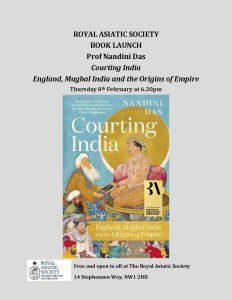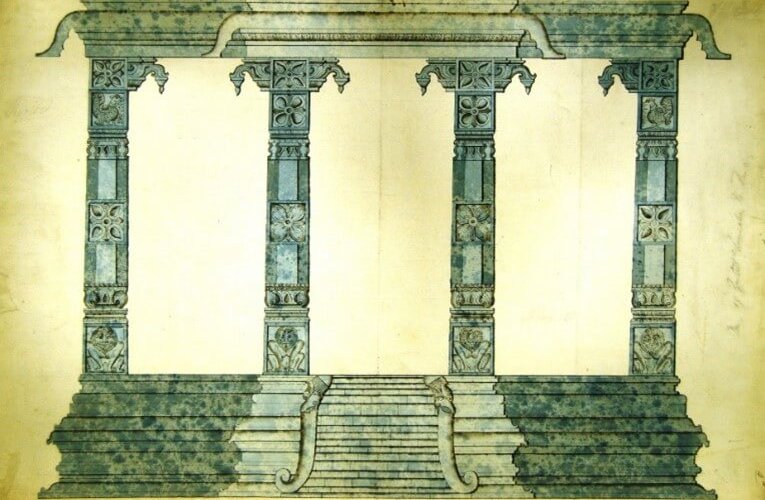Dr. Giles Tillotson and Rev. John Drew Bate
The Society has been involved in the publication of translations of works in various Asian languages through the Oriental Translation Fund which was established in 1828. On the 25th of January, Dr Giles Tillotson gave an excellent lecture on one of these publications, Essay on the Architecture of the Hindus by Ram Raz published in 1838. The lecture entitled Ram Raz and William Hodges: Theorizing Hindu Architecture provided the first in-depth study of Ram Raz (1790-1833) and his assessment of what constituted the orders of Hindu architecture. Ram Raz was commissioned by the RAS to compile a digest of Hindu architecture based on Sanskrit texts. He explains in his introduction the difficulties in undertaking such a task: both in finding the texts themselves and Sanskrit scholars who were able to translate the treatises. He commissioned drawings from the Madras Survey Department to illustrate the book and this collection of drawings of architectural elements drawn from temples in South India forms an important part of the Society’s collections.
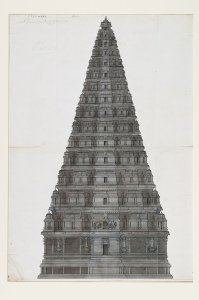
RAS 034.036 by Ram Raz
Dr Tillotson went on to compare Ram Raz’s interpretation of the texts with the work and approaches of William Hodges (1744-1797), the painter who arrived in India in 1779 and spent six years drawing landscapes and scenes of architectural interest. This talk formed part of the bicentenary lecture series and will be later published in a special issue of the Journal. We have to apologise for the complete failure of the Zoom system during the talk. Dr. Tillotson very graciously offered to record the talk so it will be available on the Society’s You Tube account.
Today, 26th January, marks the 101st anniversary of the death of Rev. John Drew Bate. Born in Plymouth in 1836, he trained at Regent’s Park College, London and, in 1865, sailed to India to work for the Baptist Missionary Society, the same year that he married Beatrice Tagg. After a period in East Bengal (now Bangladesh) he was posted to Allahabad in 1868 where he stayed until his retirement in 1897. He became a member of the Asiatic Society of Bengal in 1873 and the Royal Asiatic Society in 1881.
He authored a Hindi Dictionary, published in 1875 , adding 25,000 new words and forms of words. At his death this work was still considered the standard text and by order of the Education Department of the Government of India, copies were placed in all schools and colleges in India where Hindi was spoken. Bate contributed articles to the Missionary Herald, Baptist Magazine and Asiatic Quarterly Review. He also published An Examination of the Claims of Ishmael as viewed by Muhammadans.
He returned to England on his retirement and died on 26th January, 1923.
I have a soft spot for John Drew Bate, not because of his extensive lifeworks and achievements, impressive though they are, but because his papers, held in the Society’s archives, are the first set of papers I catalogued on my arrival at the Society.
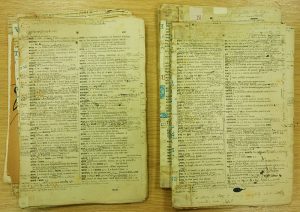
Having first been appointed in October 2014, I was faced with the task of sorting, organising and cataloguing the Society’s archives. The process is still ongoing but, in 2015, I moved from simply sorting to beginning to catalogue onto Archives Hub. And the Papers of John Drew Bate were the first set I chose to attempt. These papers include manuscript drafts for his Hindi dictionary and book on Islamic Studies as well as drafts for articles and sermon notes.
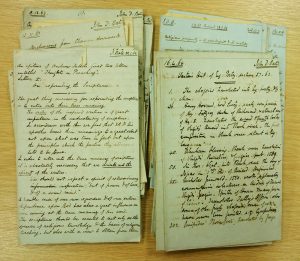
From that first set of papers there are now 250 catalogues completed, ranging from single items to complex sets of personal papers and institutional records. These can all be found on Archives Hub with which we have had a very happy relationship. However, through last year they had considerable problems with the ‘backend’ side of the site and have now withdrawn their editor function on which I (and many volunteers) created the catalogues.
Therefore it has been necessary to explore other options and, after discussion with a steering group and collaboration with senior members of Council, I am pleased to be able to work with Max Communications to create a bespoke catalogue for the Society. Max Communications host our Digital Library and we have a good working relationship with them. The archive catalogue is currently in the early stages. We have transferred all the data across but, as you might expect, there are some glitches in transferring to a new system. I am currently working systematically through the catalogues to make sure they read accurately. Just before I started writing the blog post I completed checking my 50th one – only another 200 to go!
When the checking is finished and the front page developed it will be able to go live. New catalogues will also still be added to Archives Hub which also export them to Archives Portal Europe, so there will be plenty of options for researchers to find our archival material. I am excited to have the opportunity to oversee this transition and ensure the safekeeping of the archival catalogue into the future.
The next event at the Society will be on Thursday 8th February, 6.30 pm, when Professor Nandini Das will launch her new book Courting India: England, Mughal India and the Origins of Empire. If you wish to join us over zoom please register with Matty Bradley at mb@royalasiaticsociety.org
